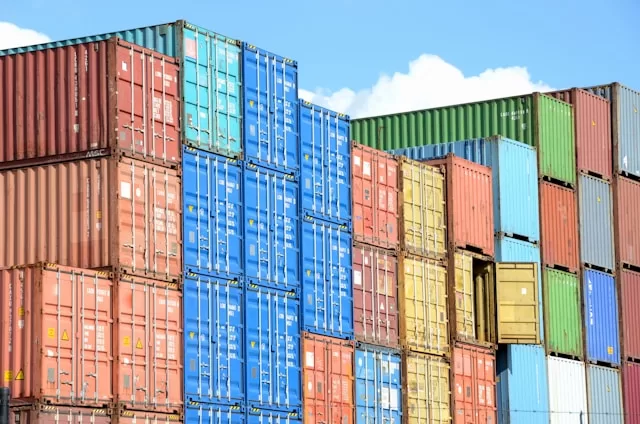UK Traders’ Guide to Customs Duties
For UK traders importing goods from overseas, one of the most significant business costs you will plan for is likely to be customs duties. At up to 25% of the value of your shipment, import duty and other fees are an expense that must be carefully planned for.
In this guide, we’ve summarised the basics you need to know about customs duties, including what types of fees you’re most likely to encounter, how to pay them, and how to ensure you aren’t paying more than necessary. Read on to find out more, and what you can expect as an importer sourcing goods from overseas.
What are customs duties?
Customs duties are monetary fees that traders pay on goods purchased and exported from foreign countries, based on the declared value of the goods. They are also sometimes referred to as customs fees, customs tariffs, or customs tax, and the final amount due to be paid may comprise multiple fees, depending on what duties your shipment will be subject to. For instance, shipments of controlled goods such as alcohol may be subject to different fees than a shipment of garments.
Customs duties serve a variety of purposes, including, but not limited to:
- Revenue generation. Customs duties collected by the UK government can fund government programmes and initiatives, to enrich the country as a whole.
- Promoting domestic trade. By imposing customs duties on goods purchased abroad, some traders may choose to buy goods within their home country, as they won’t be subject to customs duties.
- Trade regulation. Customs processes, including the application of customs duties, allow governments to monitor the amount of goods arriving in the country, and use this data to make market predictions and other decisions.

What are the different types of customs duties?
Customs duties is an umbrella term, which encompasses a wide variety of taxes and tariffs that an international shipment may be subject to. Although not every shipment will have every tax applied to it (depending on the contents), these are the most common types of customs duties that UK traders may have to pay on their imports.
Import Duties
Import duty is the most well-known duty that international shipments will be subject to. This tax is typically based on either the declared value of the goods being imported, or more specific information such as the quantity, weight, or number of items being imported. Import duties, or import tax, is imposed on import traders to prevent too much competition between domestic manufacturers and those overseas, to allow the Government to generate revenue for goods purchased internationally, and to offset the costs of customs checks and processes which must be performed on all international shipment.
Import tax is applied to all international shipments entering the United Kingdom.
Excise Duties
Whereas excise duties are often applied to goods produced in the UK, such as fuel, alcohol and tobacco products, excise duties can also be applied to goods entering the country which fall into one of these categories. This prevents UK traders from being able to bypass excise duties by purchasing stock from outside the UK.
Anti-Dumping Duties
Anti-dumping duties are taxes which are applied to prevent overseas traders from undercutting the domestic market of a country. These measures are to prevent exporters from flooding the market with a high quantity of goods, sold at a much lower price than goods produced within the country.
If high quantities of a certain type of goods are being imported, and sold well below the fair market value of the destination country, the UK government can apply an anti-dumping duty to that category of goods. This additional tax should act as a deterrent to unscrupulous importers and exporters, and help to maintain market fairness within the UK.
Tariff Rate Quotas (TRQs)
Tariff Rate Quotas (TRQs) are adjustable import duties, which vary based on the quantity of goods being imported. The higher the number of units being imported, the higher the fee that the importer will be charged. This is another tax which is intended to limit the competition between domestic goods and international goods within the UK. This type of import duty is typically applied to shipments of food products, textiles, and metals such as steel or aluminium.
How are customs duties calculated?
The amount of customs duties payable on a shipment of goods will depend upon a number of different factors. As a UK trader, these are the main criteria that His Majesty’s Revenue & Customs (HMRC) use to calculate the customs duties you will pay.
- Declared value of goods. The main bulk of the customs duties you pay will be based on the transaction value that you, the importer, have paid for the goods included in the shipment. This can range between 0% to 25%, depending on the value of goods, alongside other factors.
- Type of goods. Your customs duty tax will also differ based on the category of the goods you are importing. For instance, controlled goods such as fuel, alcohol, and cigarettes are typically subject to higher import tax than shipments of items such as garments, toys, or furniture.
- Country of origin. Duty rates are often dependent on where the shipment of goods has arrived from. Different rates apply to different countries, and the trade deals that the UK government has with the region. For instance, EU shipments have typically enjoyed lower customs duties — however, since Brexit, this is not always the case.
- Additional fees. As discussed above, additional fees may be applied to your imported goods based on the existing UK market. For instance, anti-dumping fees for goods arriving in the UK in high quantities, which could undercut the domestic market.
These are just some of the fees which can make up your final total of customs duties to be paid. Therefore, it’s a good idea to do research beforehand so that you can budget for these tariffs in advance and build them into your business plan if you’re a UK-based importer.

Who pays customs duties?
In almost all cases, the one responsible for paying customs duties is the importer, who is receiving goods from a foreign country. Whilst some sales arrangements can be made, where exporters agree to take on some burden of cost, or propose a lower price to account for duty tax, the final amount must be paid by the importer and recipient of the shipment.
Some importers will mark up their products at the point of sale, passing on some costs of import to consumers, but the up-front costs that apply when receiving the payment must still be made by the importer.
How do I pay customs duties on a shipment of goods?
There are a number of ways for UK traders to pay customs duties on their imports. These are the most common.
The Customs Declaration Service (CDS)
The Customs Declarations Service (CDS) is an online interface which allows traders to submit customs declarations and pay the required customs duties, in order to release their shipments. Previously, this was done using the Customs Handling of Import and Export Freight (CHIEF) system, but this has since been discontinued and traders are required to transition to the CDS.
CDS cash accounts, deferment accounts, and electronic payments are the preferred mode of payment by most importers. This is due to the immediacy of payment, the ability to submit and manage paperwork, and a range of other features which allow them to navigate customs processes with ease.
Direct Debit or Bank Transfer
HMRC also accepts payments made by direct debit or bank transfer, but if you’re taking this manual approach, it’s vital to double-check your details before sending funds to an account. Ensure it is an official HMRC or customs bank account, as some import businesses may find themselves targeted by online scammers, pretending to be representatives of HMRC.
Customs Agents or Brokers
Importers may also wish to employ the services of a dedicated customs agent or broker, who will take on the responsibility of submitting payments and paperwork on the business’ behalf. While a customs agent will typically employ one of the payment methods above, many businesses prefer to outsource this administrative labour to individuals who are experts in navigating customs processes.
Customs Duties: Frequently Asked Questions
How can I find out how much customs duty I will pay?
To estimate the amount of customs duty you will pay on a shipment of imported goods, you can use the UK Tariff tool and check the current customs duty rates for the goods you are planning to ship. Using the tariff code, or commodity code, you can enter this into the lookup tool along with any other required information, and the system will provide you with an estimate of how much tax you will be required to pay in order to release your shipment.
If you are using a customs broker service, many customs agents are also able to provide estimates of how much they expect you will pay. However, it is a good idea to bear in mind that variable rates such as tariff rate quotas (TRQs) could lead to the final balance you pay being higher, or lower than expected.
Can I avoid or minimise how much I pay in customs duties?
To minimise the amount that you pay in customs duty, you can:
- Buy local. Source goods from domestic, UK-based suppliers to forgo the costs of transit and import tax.
- Take advantage of preferential trade agreements with other countries. Purchase from countries that have mutually beneficial trade agreement with the UK, which include lower duties to be paid on imports.
- Pay attention to variable tariffs, such as Tariff Rate Quotas. When customs duty is based on weight or number of units, by arranging smaller shipments, you can avoid additional fees that are applied to larger, higher-value shipments.
- Seek the advice of a customs broker. Professional customs agents offer import management services, helping you to navigate the often complex customs clearance process, and avoid unnecessary fees.
- Use purpose-made software to streamline your import and export operations. Customs software solutions can save you time and money, by ensuring your operations are customs-compliant, and providing an easy user interface to manage and track your shipments.
- Use a Customs Duty Deferment Scheme (CDDS). Although these schemes won’t reduce the amount you pay, you can delay payments for up to a month, allowing you to strategically arrange them alongside your business’ income streams.
Why are customs duties so high?
Customs duties in the UK have experienced a great deal of fluctuation in recent years, due to a number of factors. International trade costs typically rise in line with inflation, and with the UK’s rate of annual inflation being reported at 4% in January 2024, it’s unsurprising that this has had a knock-on effect within the import industry. This has also meant that customs duties in the UK may appear higher than they have been in previous years.
Can I claim back customs duties on my tax return?
If you are a business owner within the UK, you can typically declare customs fees as a relevant business expense on your company’s annual tax return. Customs duties are usually not eligible to be declared on a personal tax return, but it may be worth seeking advice from an accountant or other tax professional.
Thyme-IT Customs Software Solutions
We hope that you’ve found our beginner’s guide to customs duties helpful — whether you’re a first-time trader, or are learning to navigate the customs declaration system for the first time. At Thyme-IT, we’re proud to work alongside traders across the United Kingdom and Ireland, helping them to simplify their internal customs processes with our purpose-made software solutions.
If you’re looking for a way to quickly and easily submit customs declarations, manage your documents and take control of your import or export business, our expert team is here to help. Get in touch, and a member of our team will contact you shortly to discuss what our suite of customs software solutions can do for you.
For more insights from our expert team, feel free to visit our Customs Corner blog. Or, visit our website for the full list of customs solutions that we offer.




